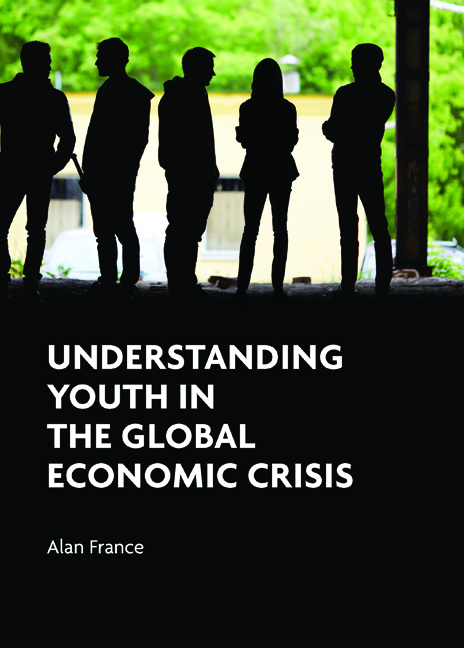Book contents
- Frontmatter
- Dedication
- Contents
- List of tables and figures
- About the author
- Acknowledgements
- Introduction
- One A political ecology of youth
- Two The global crisis and the ‘age of austerity’
- Three Education and training: the broken promise
- Four Education and training: from public good to private responsibility
- Five Unemployment and work: precarious futures
- Six NEETs and the disengaged: the ‘new’ youth problem
- Seven Divergence and difference: contrasting cross-national experiences of being young
- Eight Education, work and welfare in diverse settings
- Nine Youth and mobility: inequality, leaving home and the question of youth migration
- Ten After the crisis: social change and what it means to be young
- References
- Index
Introduction
Published online by Cambridge University Press: 01 September 2022
- Frontmatter
- Dedication
- Contents
- List of tables and figures
- About the author
- Acknowledgements
- Introduction
- One A political ecology of youth
- Two The global crisis and the ‘age of austerity’
- Three Education and training: the broken promise
- Four Education and training: from public good to private responsibility
- Five Unemployment and work: precarious futures
- Six NEETs and the disengaged: the ‘new’ youth problem
- Seven Divergence and difference: contrasting cross-national experiences of being young
- Eight Education, work and welfare in diverse settings
- Nine Youth and mobility: inequality, leaving home and the question of youth migration
- Ten After the crisis: social change and what it means to be young
- References
- Index
Summary
Background
Over the last thirty years it has become increasingly clear that significant changes have taken place worldwide, that are reconfiguring and changing the experience of growing up for those leaving compulsory education at sixteen. Of course, these experiences are not uniform but it is safe to say that the world for the young today now looks significantly different to that experienced by their parents and grandparents. Major changes across the previous three decades, especially in young people's experiences and opportunities to education, training and employment, have seen the process of growing up in many countries extended and redefined. With the coming of the 2007 financial crisis it also seemed that the young were adversely affected especially as a result of high unemployment. This event undoubtedly created an economic and social rupture in a number of ‘epicentre’ nations, but it also had a global ripple effect, creating significant political and economic impact in countries that were not central to the crisis (Konzelmann, 2014). The question then arose of what impact this crisis, and the great recession that followed, had on what it might mean to be young today. Yet to make sense of this we need to locate the discussion in a historical context, exploring some of the major economic and political changes which have been taking place that provided the setting and environment of how nation states responded to the 2007 crisis.
To achieve this the book will undertake a detailed examination of developments in eight nation states to illuminate young people's experiences of growing up today. These countries are the United Kingdom, Australia, New Zealand, Canada, Spain, Japan, Poland and Norway. It is important to recognise that this is not a global analysis; in such a diverse world that task would be impossible. The analysis is of a range of countries defined as belonging to ‘developed’ or ‘advanced economies’ (OECD, 2014a). While such terms are a reflection of Western-Northern hegemony, rooted in a colonising history that sees ‘modernisation’ or ‘advancement’ as ‘natural’ or ‘evolutionary’, the term does define a group of countries that have significant economic power and influence over the rest of the world (Hoogvelt, 2001). This classification includes countries such as the US, the United Kingdom (UK), Germany, France, Australia and many others (OECD, 2014a).
- Type
- Chapter
- Information
- Understanding Youth in the Global Economic Crisis , pp. 1 - 12Publisher: Bristol University PressPrint publication year: 2016



